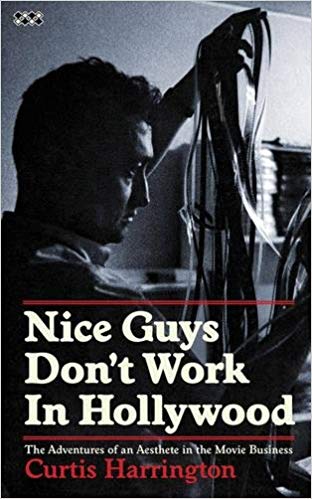 By CURTIS HARRINGTON (Drag City Incorporated; 2013)
By CURTIS HARRINGTON (Drag City Incorporated; 2013)
The late Curtis Harrington had one of the most eclectic careers of any filmmaker who ever lived. Consider: his directorial tenure spanned the underground movie scene of the 1940s and 50s, mainstream Hollywood in the 1960s, the American TV movie arena of the 1970s, and the world of episodic television in the 1980s. This posthumously published memoir is a frank and fast moving book about which my only real complaint is that, at just 197 pages, it’s far too short!
Harrington was raised in Southern California in the midst of the Great Depression, during which he developed his lifelong passions for Edgar Allan Poe and filmmaking. Harrington’s first stab at filmmaking was, appropriately enough, a short adaptation of Poe’s “The Fall of the House of Usher” made when he was fourteen. Of his homosexuality Harrington is surprisingly nonchalant, claiming that “I followed my feelings and impulses, and it did not occur to me to attach any sense of guilt or shame to my activities.”
During college in the 1940s Harrington got a job in Paramount’s publicity department and published a pioneering assessment of the films of Josef von Sternberg. His first significant film, the underground classic FRAGMENT OF SEEKING, was made while enrolled in the USC Cinema Department. Further experimental shorts—ON THE EDGE and PICNIC—followed, after which Harrington decamped to New York City and Europe, where he partook in the artistic renaissance of the time and met several famous figures.
Back in Hollywood Harrington worked as an assistant to the mega-producer Jerry Wald (the alleged inspiration for the title character of Budd Schulberg’s classic Hollywood tome WHAT MAKES SAMMY RUN?) and helped hash out the screenplay of Wald’s greatest success PEYTON PLACE. Following this Harrington made the horror classic NIGHT TIDE, followed by the Roger Corman sponsored patch job QUEEN OF BLOOD, the Universal Pictures production GAMES, and WHAT’S THE MATTER WITH HELEN?, apparently Harrington’s last big studio picture that turned out exactly as he wanted it.
He was a hired hand on WHOEVER SLEW AUNTIE ROO? (1972), while THE KILLING KIND (1973) was marred by trim-happy producers. In between those films Harrington shot the Anthony Perkins headlined TV movie HOW AWFUL ABOUT ALLAN, upon which Harrington mistakenly believed he was “killing time and making a few bucks between real film work.” TV movies, however, became his bread and butter for much of the remainder of the seventies, followed by episodes of CHARLIE’S ANGELS, DYNASTY and THE COLBYS, during which he “became aware of the incredible lengths the executives and producers will go to preserve the blandness and uniformity of their product.” Harrington also found time for the CARRIE-inspired feature RUBY and the Cannon production MATA HARI before eventually returning to the type of idiosyncratic filmmaking that began his career with 2002’s USHER (which featured Church of Satan headliners Nikolas and Zeena Schreck, who for some reason aren’t mentioned here).
Harrington provides a good deal of the expected name dropping in his account, dishing on his encounters with the likes of Kenneth Anger, Anais Nin, Christopher Isherwood, Jean Cocteau, Barbara Stanwyck, Aaron Spelling and many others. Stanley Kubrick is remembered for bursting into tears over the poor reception of his debut film FEAR AND DESIRE, while a young Joel Schumacher, who worked for Harrington as a costume designer, is characterized as possessing “an aura of kindness that masked an iron will bent on turning everything his way.” As for Harrington himself, he comes off as a thoroughly nice guy (the title is obviously intended ironically) whose love of the macabre offsets an unerringly kind-hearted nature.
Also included in this book are Harrington’s youthful essay on Josef Von Sternberg and his heretofore unpublished short story “The Secrets of the Sea,” which inspired NIGHT TIDE. The latter shows that Harrington, despite an unfortunate penchant for clichéd phrases, had a definite gift for prose fiction. It’s a shame he didn’t develop it further.
